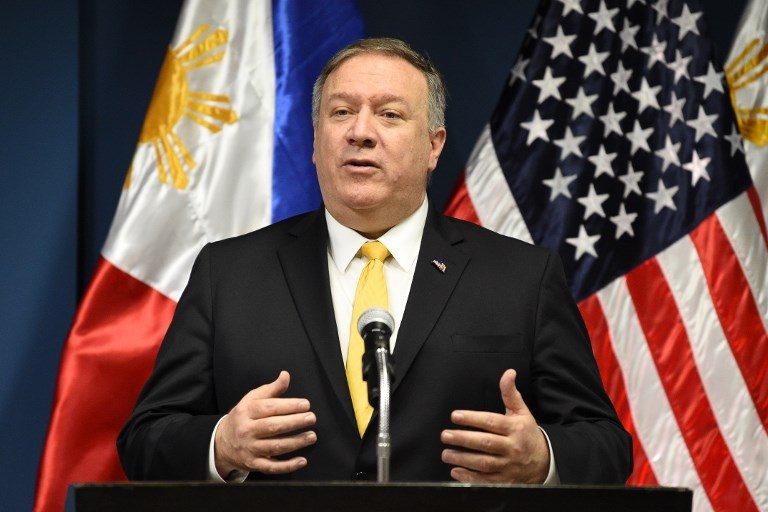SUMMARY
This is AI generated summarization, which may have errors. For context, always refer to the full article.

MANILA, Philippines – The use of technology from Chinese communications equipment provider Huawei Technologies poses risks to Filipinos and may prevent the United States from operating its own equipment in the Philippines, warned US Secretary of State Mike Pompeo.
Pompeo gave the warning at his joint press conference with Foreign Affairs Secretary Teodoro Locsin Jr, when asked to comment on the Phiippines’ use of Huawei 5G technology and how this will affect US relations with the Philippines.
The Philippines’ two telecommunication players, PLDT and Globe Telecom, are engaging Huawei in their rollout of 5G networks.
Speaking on Friday in Manila, the US’ top diplomat said Huawei cannot be trusted.
“We believe that competition, whether it’s in 5G or some other technology, ought to be open, free, transparent, and we worry that Huawei is not that,” he said.
“Our task has been to share with the world the risks associated with that technology, the risks to the Filipino people, the risk to Philippine security,” Pompeo added.
Apart from the supposed dangers to Filipino consumers, Pompeo spoke of how the adoption of Huawei technology in the Philippines might impact on US technology, specifically when used in relation to its security alliance with the Philippines.
There is a risk, he said, “that America may not be able to operate in certain environments if there is Huawei technology adjacent to that.”
The US, the Philippines’ oldest defense treaty ally, has contributed funding and equipment to the Armed Forces of the Philippines’ modernization program, and has been a partner in Manila’s counter-terrorism efforts.
Pompeo said that while every nation must make “their own sovereign decision” on the use of Huawei technology, the US wants to “make sure that the world has its eyes wide open” on the risks posed by the use of Huawei systems in infrastructure and the backbone of communication networks.
Crusade
Pompeo has been on a crusade in recent days to warn the world against Huawei. (READ: Huawei racks up 5G deals at MWC 2019 despite US pressure)
He has told US allies that the superpower would not partner with countries that make use of Huawei systems, as doing so would endanger the US.
In Manila, Pompeo pitched US technology instead.
“American companies are the best partners in the priorities of infrastructure development and the digital ecnomy because they operate with the highest standards of transparency and adherence to the rule of law. The same cannot be said for Chinese state-run or state-backed enterprises,” he said.
Huawei deals with Duterte gov’t
Will Pompeo’s advice be heeded in a country whose government has pivoted to China? President Rodrigo Duterte has embraced China and Chinese technology, even personally offering Beijing the chance to help set up the Philippines’ third telecommunications player.
The Duterte administration has also been in talks with Huawei for some major government projects. The Bases Conversion and Development Authority, for instance, signed a memorandum of understanding with Huawei for the development of “smart cities” in Clark, Pampanga and Fort Bonifacio, Taguig.
The Department of Interior and Local Government is also eyeing a partnership with Huawei and China Telecom for its 18-city, 12,000-camera surveillance project called Safe Philippines.
The China-funded project has been flagged by senators concerned about security and privacy risks. – Rappler.com
Add a comment
How does this make you feel?
There are no comments yet. Add your comment to start the conversation.